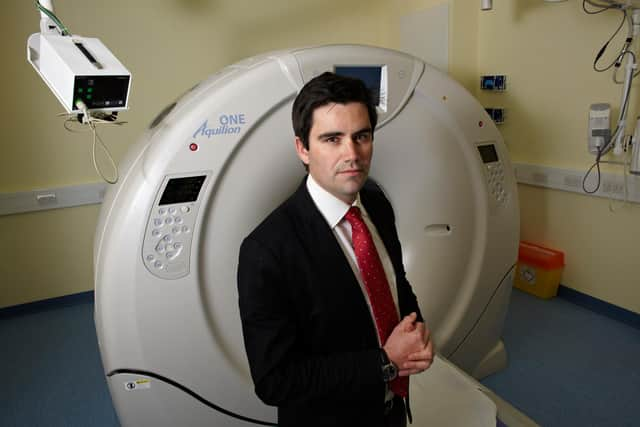Trial of heart scanning technology could lead to life-saving treatments
and live on Freeview channel 276
Researchers will use pioneering imaging techniques to detect scar tissue as it is formed on the heart – the cause of almost all forms of heart failure.
While scar tissue is normal after many conditions, including heart attacks and heart valve disease, a build up of too much can stop the heart beating efficiently.
Advertisement
Hide AdAdvertisement
Hide AdUntil now scanners have only been able to identify this scarring after it has formed, and only in certain places.


If this trial, funded by the British Heart Foundation, is successful, researchers will be able to see and understand more of how scars are formed which it is hoped will lead to better treatments.
Professor Marc Dweck, Chair of Clinical Cardiology at Edinburgh University and lead for the project, said the ability to spot scarring in real time as it develops on the heart muscle would be a “major scientific advance” and could change how patients are diagnosed and treated.
"Our understanding of how scarring develops in the heart muscle isn't very good,” he said.
Advertisement
Hide AdAdvertisement
Hide Ad"We don't really understand the processes that turn it on, the processes that turn it off, and the processes that cause it to carry on when we don't want it to and lead to heart failure.
"That's where this scanning technology is exciting, because we're able to study that in in our patients whilst they have heart disease.”
Scarring is an important target, Prof Dweck said, as though there are some exceptions it is a cause of all forms of heart failure.
“If you have a heart attack, in the early stages the scarring is good because it lets the heart heal up, stops it from rupturing and stops the patient from dying,” he said.
Advertisement
Hide AdAdvertisement
Hide Ad"But if the scarring is excessive, then that leads to heart failure.”
Prof Dweck said the study should produce “exciting” results.
“I think we’re really going to learn a lot, and I think that will accelerate the development of new treatments for heart failure and other heart muscle conditions,” he said.
Gordon Sharpe, from Edinburgh, is one of the patients taking part in the trial.
Advertisement
Hide AdAdvertisement
Hide AdThe 72-year-old had a heart attack at home in 2021, and was taken to Edinburgh’s Royal Infirmary where he was found to have a blocked artery.
Mr Sharpe said he “jumped at the chance” to be involved.
"I strongly believe that this line of research is essential if we are to learn how to develop best-timed treatment and therapies which could greatly improve the quality and scope of life for those who have heart attacks in the future,” he said.
"There is no doubt in my mind that this type of research funded by the BHF will spawn other studies and prove highly productive in both saving and improving lives.”
Professor Dweck’s project is one of more than 100 currently funded by the BHF in ten Scottish universities.
Advertisement
Hide AdAdvertisement
Hide AdJames Jopling, Head of BHF Scotland, said: “This is an example of how cutting-edge research is transforming our understanding of heart disease, including coronary heart disease – the cause of most heart attacks - and one of Scotland’s biggest killers.”
A message from the Editor:
Thank you for reading this article. We're more reliant on your support than ever as the shift in consumer habits brought about by coronavirus impacts our advertisers.
If you haven't already, please consider supporting our trusted, fact-checked journalism by taking out a digital subscription.
Comment Guidelines
National World encourages reader discussion on our stories. User feedback, insights and back-and-forth exchanges add a rich layer of context to reporting. Please review our Community Guidelines before commenting.
